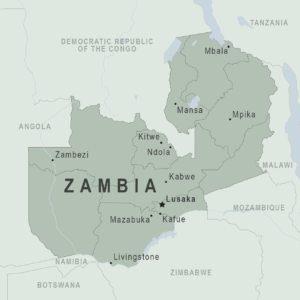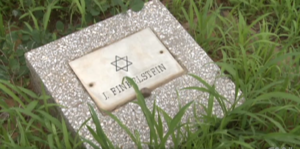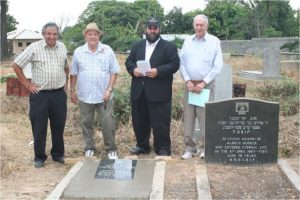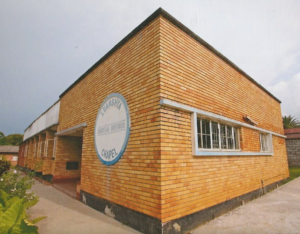 European Jews came to Zambia at the end of the 19th century with many settling in Livingstone. These pioneers were looking for better economic opportunities; later they came as refugees fleeing Nazi persecution, mainly from Germany, Lithuania and Latvia. Zambia was one of the few countries that welcomed them. When the country gained independence in 1964 there was an exodus of many Jews. Although the community was relatively small, it included significant figures in the country’s economical and political life.
European Jews came to Zambia at the end of the 19th century with many settling in Livingstone. These pioneers were looking for better economic opportunities; later they came as refugees fleeing Nazi persecution, mainly from Germany, Lithuania and Latvia. Zambia was one of the few countries that welcomed them. When the country gained independence in 1964 there was an exodus of many Jews. Although the community was relatively small, it included significant figures in the country’s economical and political life.
Among those who stayed is Simon Zukas who played a key role in Zambia’s struggle for independence. Today he is chairman and his wife Cynthia a member of the Council for Zambian Jewry. Cynthia is also head of The Lechwe Trust that promotes, and encourages Zambian visual arts.
 Among the most influential Jewish immigrants were the Susman brothers, businessmen from Lithuania. They arrived in 1901 as cattle traders and settled in Livingstone. They built a business empire that included copper mines and ranches and were leaders of the Jewish community. They also led the construction of the city’s synagogue in the late 1920s. The building is still standing, but these days it’s used as a Christian church, showing the faint outline of the Star of David, the symbol of Judaism, just visible over the main entrance.
Among the most influential Jewish immigrants were the Susman brothers, businessmen from Lithuania. They arrived in 1901 as cattle traders and settled in Livingstone. They built a business empire that included copper mines and ranches and were leaders of the Jewish community. They also led the construction of the city’s synagogue in the late 1920s. The building is still standing, but these days it’s used as a Christian church, showing the faint outline of the Star of David, the symbol of Judaism, just visible over the main entrance.
 Maureen and Dennis Figov are the last Jews left in Zambia’s Copperbelt, a region that in the 1960s boasted some 300 Jewish families. Figov’s home and his consignment store off of Denis Figov Avenue are repositories of the region’s history. In operation continuously since Figov’s father opened for business in 1936, the store contains beautifully maintained Singer sewing machines, ancient watches, and new and old furniture. The predominately Christian community is peculiarly attached to Luanshya’s two Jews, whom they consider a “blessed people” both because they are pillars of the community and for their “biblical background.”
Maureen and Dennis Figov are the last Jews left in Zambia’s Copperbelt, a region that in the 1960s boasted some 300 Jewish families. Figov’s home and his consignment store off of Denis Figov Avenue are repositories of the region’s history. In operation continuously since Figov’s father opened for business in 1936, the store contains beautifully maintained Singer sewing machines, ancient watches, and new and old furniture. The predominately Christian community is peculiarly attached to Luanshya’s two Jews, whom they consider a “blessed people” both because they are pillars of the community and for their “biblical background.”
 At its peak, the Jewish community in Zambia numbered 1200; today, only 35 Jews remain. The Jewish community today is almost entirely concentrated in Lusaka, the nation’s capital. There are, however, some small communities living elsewhere, mainly in Ndola and Livingstone. There is little in the way of organized Jewish life in Zambia. The Beit Talmidim Synagogue in Lusaka is the only active Jewish place of worship in the country. The Ndola Hebrew Congregation was active for many decades but was ultimately forced to close due to a lack of congregants during the 1990s. There is also no local rabbi.
At its peak, the Jewish community in Zambia numbered 1200; today, only 35 Jews remain. The Jewish community today is almost entirely concentrated in Lusaka, the nation’s capital. There are, however, some small communities living elsewhere, mainly in Ndola and Livingstone. There is little in the way of organized Jewish life in Zambia. The Beit Talmidim Synagogue in Lusaka is the only active Jewish place of worship in the country. The Ndola Hebrew Congregation was active for many decades but was ultimately forced to close due to a lack of congregants during the 1990s. There is also no local rabbi.
Recently a museum on the history of Zambian Jewry opened in the city of Livingston. The Jewish community maintains the three Jewish cemeteries in Zambia. A Jewish Museum was opened in 2013, financed by the sale of Jewish properties in Zambia. The city’s Jewish Museum, tells the story of the Jewish people who settled in and around Livingstone. Although the community was relatively small, it included significant figures in the country’s economical and political life.